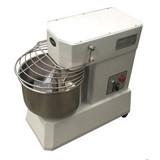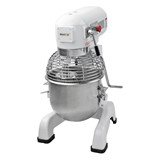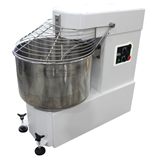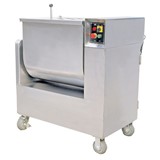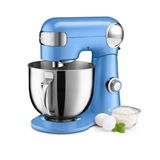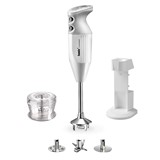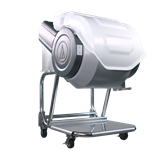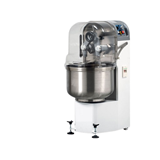Looking to buy an industrial spiral mixer in Australia? Explore price ranges, machine types, warranties, and essential maintenance advice to find the perfect mixer for your business needs. Stay compliant and save with expert tips.
Key takeaways
- Price range: Industrial spiral mixers in Australia typically range from $5,500 to $45,000+, depending on bowl capacity, build quality, automation level, and imported brand costs.
- Capacity: Mixers range from 20L to over 300L, suitable for bakeries producing from 50 kg to 600 kg of dough per hour.
- Types: Choose from fixed bowl, removable bowl, or tilting head spiral mixers, with single or double-speed motors.
- Maintenance cost: Average annual maintenance costs are between $400 and $1,500, depending on size, age, and motor wear.
- Financing available: Australian lenders offer equipment loans and leases at 5% to 9% APR, depending on business profile.
- Warranties: Standard warranties cover 12 to 24 months, with some extended to 5 years for premium models.
- Compliance: Machines must meet AS/NZS 4024 (machine safety), AS/NZS 60335 (electrical safety), and FSANZ food-grade requirements.
- Common questions: Buyers often ask about dough capacity, speed options, cleaning ease, and mixer lifespan.
Introduction
If you operate a commercial bakery, pizza production line, or food manufacturing facility in Australia, investing in the right industrial spiral mixer can dramatically boost your output, dough consistency, and labour efficiency. With dozens of options on the market, understanding what you're buying and how it performs long-term is essential for making a profitable investment.
This guide is tailored for Australian business owners and procurement managers. It walks you through the latest industrial spiral mixer prices, types, features, operating costs, compliance requirements, and what to ask suppliers before you buy.
Types of industrial spiral mixers
1. Fixed bowl spiral mixers
- Bowl and mixing tool are fixed in place.
- Most common type for mid-sized and large commercial bakeries.
- Lower cost and robust performance.
- Prices: $5,500 to $20,000.
2. Removable bowl mixers
- Bowl can be detached for easier cleaning or integration with other machines.
- Suitable for multi-batch operations.
- Higher upfront cost due to added convenience.
- Prices: $15,000 to $35,000.
3. Tilting head spiral mixers
- Mixing head can tilt back for easier dough removal.
- Ideal for facilities with limited floor space.
- Typically used in smaller batch or artisan baking environments.
- Prices: $6,000 to $18,000.
4. Two-speed spiral mixers
- Allow for slow initial mixing followed by fast kneading.
- Improves gluten development and dough texture.
- Standard in most modern commercial kitchens.
Industrial spiral mixer prices in Australia
Price ranges by capacity:
- Small mixers (20–60L): $5,500 to $10,000
- Medium mixers (60–120L): $10,000 to $25,000
- Large mixers (120–300L+): $25,000 to $45,000+
Additional cost considerations:
- Delivery and installation: $500 to $2,000
- Operator training and documentation
- Maintenance contract: $400 to $1,500 per year
- Spare parts: Beaters ($250+), gears, motors, belts
Operation and features
Spiral mixers are designed to mix dough more gently and efficiently than planetary mixers, using a fixed spiral hook and rotating bowl to mimic hand kneading.
Key operational features:
- Digital or analogue control panels
- Safety cut-off guards and emergency stops
- Variable speed settings or programmable mixing cycles
- Stainless steel construction for hygienic food contact
Maintenance and parts
Regular maintenance tasks:
- Inspect drive belts and gearboxes monthly
- Clean bowl, hook, and guard after each use
- Lubricate bearings and chains quarterly
Common part replacements:
- Mixing hook or spiral: every 2–5 years
- Drive belts: every 1–2 years
- Electrical switches or control panels: as needed
Financing options in Australia
- Equipment loans available through major banks and non-bank lenders.
- Terms: 2 to 7 years
- Interest rates: 5% to 9% APR
- Many finance options qualify for instant asset write-off under ATO guidelines.
Warranty and after-sales support
- Most machines come with 12 to 24-month warranties.
- Premium models may include up to 5 years cover (parts + labour).
- Ensure supplier offers access to parts and service technicians locally.
- Clarify if warranty covers motor, electrical, or wear parts.
Compliance and certification in Australia
When purchasing industrial spiral mixers or other commercial food-processing equipment in Australia, ensuring compliance with relevant safety, hygiene, and regulatory standards is essential for legal operation and workplace safety. Key certifications and standards to consider include:
- AS/NZS 4024 – Machinery safety design and risk reduction standard ensuring machines are engineered to minimise hazards during operation.
- AS/NZS 60335-1 and AS/NZS 60335-2-64 – General and specific electrical safety standards for household and commercial kitchen appliances, covering safe electrical operation.
- AS/NZS 60335-2-14 – Specific standard for commercial electric food mixers, ensuring additional safety requirements for mixing equipment are met.
- FSANZ Standard 3.2.3 – Food Standards Australia New Zealand regulation governing materials and equipment in contact with food to ensure they are safe and hygienic.
- Regulatory Compliance Mark (RCM) – Mandatory for all imported electrical equipment, verifying compliance with Australian electromagnetic compatibility (EMC) and electrical safety regulations.
- Energy Rating Label – Although not mandatory, this government-backed label indicates energy efficiency, helping businesses reduce operating costs and environmental impact.
- Local and state health regulations – Compliance with jurisdiction-specific food safety and hygiene laws is necessary, especially for commercial kitchens and food manufacturing facilities.
- HACCP-compatible design – Equipment should facilitate adherence to food safety management systems such as HACCP, with hygienic designs that allow thorough cleaning and prevent contamination.
Ensuring your equipment meets these certifications and standards helps safeguard operator safety, product quality, and legal compliance across Australia’s varied regulatory landscape. Always verify with suppliers that the specific model you purchase is compliant with all relevant Australian standards and local regulations applicable to your business.
Cost of ownership breakdown
Understanding the true cost of owning an industrial spiral mixer goes beyond the purchase price. Consider the following factors:
- Initial purchase price: Small units (20–60L) typically cost $5,500–$10,000; mid-size (60–120L) $10,000–$25,000; large units (120–300L+) $25,000–$45,000+.
- Electricity costs: Mixers use approximately 1.5–3.5 kWh per batch. Estimated annual electricity cost ranges from $350 to $1,000 depending on size. Energy-efficient motors can reduce consumption by up to 20%.
- Maintenance and servicing: Annual servicing costs between $400 and $1,500. Common part replacements (spiral hook, drive belts, control panels) add to ongoing expenses, with around $2,000–$5,000 expected over five years.
- Labour savings: Upgrading can reduce dough preparation time by 30–50% per batch, saving up to 10 labour hours per week in high-volume settings.
- Return on investment: For bakeries producing 300–500 kg of dough daily, a quality spiral mixer typically pays for itself within 12 to 24 months through efficiency gains and waste reduction.
Space and installation requirements
Proper site preparation ensures safe, efficient operation of your spiral mixer:
- Space and clearance: Mixers range from approximately 1.2m x 1m (60L) to 1.8m x 1.5m (120L+). Maintain at least 600mm clearance around for ventilation and service access. Allow 1m overhead clearance for bowl access or tilting.
- Flooring: Floors should be non-slip, sealed, level, and support 400–700 kg.
- Power supply: Small mixers usually require 240V single-phase; larger models often need 415V three-phase. A dedicated, RCD-protected circuit is required to meet Australian wiring standards.
- Ventilation and ambient temperature: Keep the area below 25°C with good ventilation. Avoid placing near heat sources like ovens or steam.
- Noise: Mixers generate 65–75 dB during operation. Consider noise management for open workspaces.
- Delivery access: Ensure the mixer can fit through standard commercial doorways (approx. 900mm) and that the floor can support delivery equipment and machine weight.
Common questions buyers ask
1. How do I choose the right capacity mixer?
Match bowl size to your daily dough volume using the rule: 1 litre ≈ 0.7 kg dough. Factor in peak demand and batch sizes, and consult suppliers for tailored advice.
2. Can spiral mixers handle other dough types?
Yes, they work well for pizza dough, brioche, bagels, and soft pastries, thanks to their gentle yet thorough mixing action.
3. Are spiral mixers easy to clean?
Fixed bowl mixers require manual cleaning, while removable bowl models simplify sanitation. Some machines offer automated cleaning features.
4. How long do spiral mixers last?
With regular maintenance, expect 10–15 years of reliable service.
5. Is training needed to operate one?
Basic operation is straightforward, but training improves safety, mixing quality, and maintenance. Suppliers usually provide support.
Conclusion
Investing in an industrial spiral mixer can transform your commercial baking operation — but only if you choose the right type, capacity, and supplier. With prices in Australia ranging from $5,500 to over $45,000, consider your production needs, available space, and cleaning requirements. Understanding operating costs, warranties, and compliance will help you make a reliable, long-term investment.
Use this guide as your reference point when comparing quotes, shortlisting suppliers, or preparing to finance your next mixer purchase in Australia.


